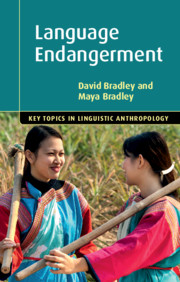Book contents
- Language Endangerment
- Key Topics in Linguistic Anthropology
- Language Endangerment
- Copyright page
- Contents
- Tables
- Acknowledgements
- 1 Introduction
- 2 Stages of Language Endangerment
- 3 Working in a Community
- 4 Identity and Attitudes
- 5 Language Knowledge and Use
- 6 The Sociolinguistic Setting
- 7 Linguistic Processes
- 8 Policy and Planning
- 9 Language Reclamation
- 10 Methodology
- 11 Conclusion
- Glossary of Terms
- References
- Index
- References
2 - Stages of Language Endangerment
Published online by Cambridge University Press: 11 November 2019
- Language Endangerment
- Key Topics in Linguistic Anthropology
- Language Endangerment
- Copyright page
- Contents
- Tables
- Acknowledgements
- 1 Introduction
- 2 Stages of Language Endangerment
- 3 Working in a Community
- 4 Identity and Attitudes
- 5 Language Knowledge and Use
- 6 The Sociolinguistic Setting
- 7 Linguistic Processes
- 8 Policy and Planning
- 9 Language Reclamation
- 10 Methodology
- 11 Conclusion
- Glossary of Terms
- References
- Index
- References
Summary
In the early days of work on language endangerment, many negative terms were used to refer to this field: language death, language contraction, obsolescence (Dorian, 1989); perilinguistics (peril + linguistics), thanatoglossia and necroglossia (Matisoff, 1991: 201, 224). Endangered languages used to be called dying languages or, less negatively, threatened languages, and languages no longer spoken were said to be dead languages. In the last twenty years, we have moved away from these morbid metaphors and the terminology has become more stable, but the situation has continued to deteriorate, even though public awareness of language endangerment and scholarly attention to it have greatly increased.
- Type
- Chapter
- Information
- Language Endangerment , pp. 14 - 37Publisher: Cambridge University PressPrint publication year: 2019

